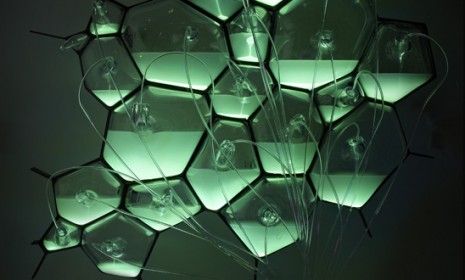Get ready for... poo-powered lights?
Electronics company Philips has a plan to fuel glowing green bulbs with the waste from your toilet

A free daily email with the biggest news stories of the day – and the best features from TheWeek.com
You are now subscribed
Your newsletter sign-up was successful
The hunt for the most eco-friendly way to light your home didn't end with the creation of compact fluorescent bulbs and LED lights. Dutch electronics giant Philips has developed a lighting system that follows the example of the humble firefly, producing a green glow that uses no electricity at all. The fuel source? In part, human waste. Here, a guide to this new "bio-light" technology:
How does this light work?
Philips harnessed the same source of illumination that makes fireflies and certain algae glow at night. The company's Microbial Home system creates light by putting bioluminescent bacteria inside hand-blown glass bulbs. The living bacteria are fed nutrients through thin silicon tubes, and they use the enzyme luciferase to generate light. As long as the bacteria are kept fat and happy, they generate a soft green glow, without the help of electricity or solar energy.
The Week
Escape your echo chamber. Get the facts behind the news, plus analysis from multiple perspectives.

Sign up for The Week's Free Newsletters
From our morning news briefing to a weekly Good News Newsletter, get the best of The Week delivered directly to your inbox.
From our morning news briefing to a weekly Good News Newsletter, get the best of The Week delivered directly to your inbox.
Where do the nutrients come from?
There's no way to sugarcoat it — the bio-light harnesses the energy in poo. In fact, the bacteria in the system's glass bulbs feed on several kinds of waste material generated in the typical home. They get methane generated by the Microbial Home bio-digester unit, which processes everything from composted bathroom solids to vegetable matter discarded in the kitchen. "Just keep on, um, producing waste," says Evan Ackerman at Dvice, "and you'll have all the alien mood-lighting you could ever want."
And this is enough to light up the house?
Not quite. The technology is still a work in progress, and its glow is far less bright than today's standard artificial light. Still, says Randolph Jonsson at Gizmag, "it's definitely a step in the right direction, especially because it gets people thinking about untapped household energy sources."
A free daily email with the biggest news stories of the day – and the best features from TheWeek.com
-
 The Olympic timekeepers keeping the Games on track
The Olympic timekeepers keeping the Games on trackUnder the Radar Swiss watchmaking giant Omega has been at the finish line of every Olympic Games for nearly 100 years
-
 Will increasing tensions with Iran boil over into war?
Will increasing tensions with Iran boil over into war?Today’s Big Question President Donald Trump has recently been threatening the country
-
 Corruption: The spy sheikh and the president
Corruption: The spy sheikh and the presidentFeature Trump is at the center of another scandal